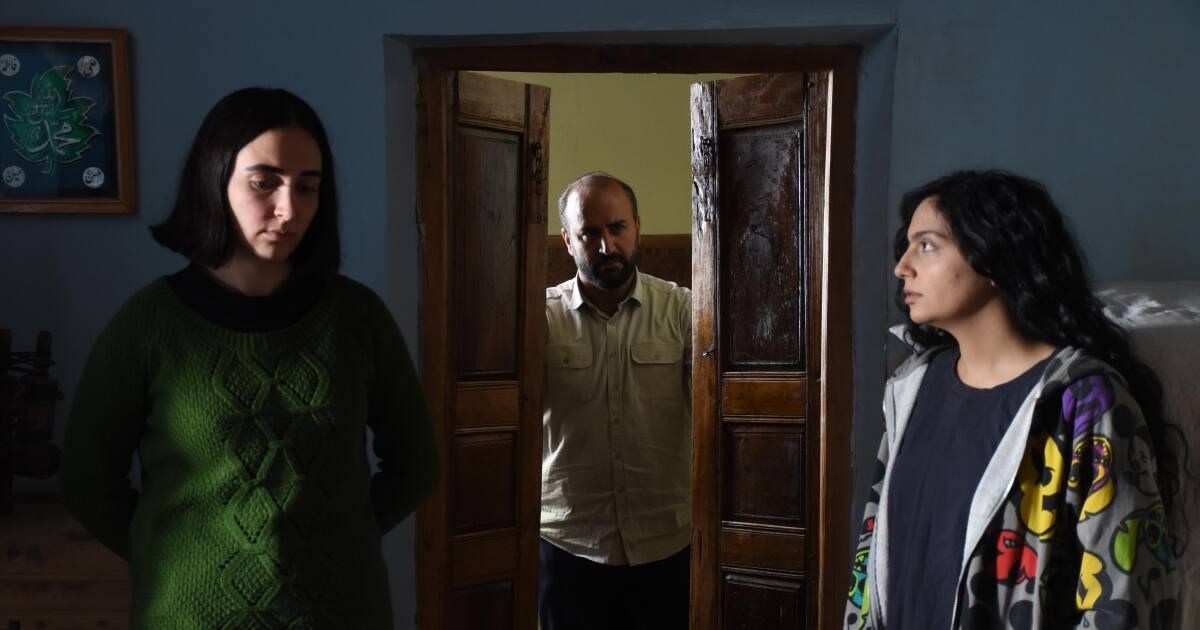Reality seeps into “The Seed of the Sacred Fig” in multiple ways, including some that writer-director Mohammad Rasoulof could not have imagined when he filmed this absorbing drama in secret. One of Iran's iconic filmmakers (and one of those most often targeted by the theocratic government), the 52-year-old author, now living in exile in Europe, tells the story of a family whose social position is seen threatened by simmering social tensions right outside its door. To preserve the rigid status quo, the clan patriarch will do everything possible to prevent the winds of change from invading his home and affecting his wife and daughters. By making the political personal, Rasoulof warns us that repression begins at home.
Misagh Zare plays Iman, who has just been promoted to investigative judge at the Revolutionary Court, a reward for 20 years as a dedicated lawyer. His supportive wife, Najmeh (Soheila Golestani), is proud of him but also excited about what this new job means for them and their children, the strong-willed 21-year-old Rezvan (Mahsa Rostami) and the insecure teenager Sana (Setareh Maleki). ). They will receive a spacious house in a better section of Tehran, and maybe they can finally buy that dishwasher Najmeh has been longing for. But Iman warns her family that since judges are demonized in Iranian society, they should be careful not to spread this news. To underline the occupational risks that await Iman, she has been given a gun for protection.
As soon as Iman shows that gun to his alarmed wife (it's loaded, but he assures her it's on the safety), the audience can start worrying about exactly when the gun will fire. Provocatively, Rasoulof makes no attempt to hide his story's metaphors or plot twists. If anything, it boldly foreshadows the darkness on the horizon, filming its drama austerely, with the weight of inevitable doom hanging over everything.
Over the past 15 years, Rasoulof (“Manuscripts Don't Burn,” “No Evil”) has been jailed several times and had his passport confiscated, accused of spreading anti-government propaganda through his politically oriented films. “The Seed of the Sacred Fig” was inspired by one such prison stint in 2022, which occurred at the same time as that summer’s “Woman, Life, Freedom” uprising, sparked by the death of 22-year-old student Mahsa Amini. years, while in police custody, who arrested her for not wearing a hijab in public. (Authorities claimed Amini died of a heart attack, but her family insisted she was fatally beaten.)
Those real-life events light a match that lights the film's slow fuse. At first, Rezvan and Sana express frustration that their father's new job requires them to behave “properly” outside the home. (Who knows who might be monitoring their social media presence?) But soon, it will be impossible for them or their mother to miss the violent protests following Amini's death. Najmeh strongly echoes what she sees on state news services: Amini's death was an accident, while her daughters, who get information on their smartphones, strongly suspect the opposite. And then Rezvan's college friend Sadaf (Niousha Akhshi) is accidentally caught in a campus protest and her face is destroyed by pellets fired by the police. Long maintaining that the protesters are just thugs, Najmeh painfully removes bullets from Sadaf's bleeding wounds, and his assumptions about the government he has loyally obeyed crumble.
A film about complicity and denial, “The Seed of the Sacred Fig,” examines how a seemingly reasonable husband and wife can tacitly support this national farce. Iman quickly learns that the “investigation” part of her job is more of a suggestion: she is expected to sign death sentences for people the prosecutor has demanded be executed. At first her conscience bothers her, but Zare's performance is a marvel of quiet rationalization as Iman gradually decides that going with the flow is better than making waves. Iman, a man with no solid principles beyond protecting his status, is both pathetic and terrifying; The latter occurs when Iman discovers that her gun is missing, an oversight that could cause her to lose her promotion. His zeal to determine who took the gun reveals a surprisingly monstrous side, turning his wife and children into frightened suspects and leading to a jarring, tonal-shifting ending that proves a cathartic and believable final destination for a film seething with distrust. and anger.
Anticipating the inflammatory theme of his film, Rasoulof had to cast and film “The Seed of the Sacred Fig” without notifying the authorities. That knowledge adds additional layers of defiance and bravery to this grim story, which incorporates real footage of protests and videos of police brutality to amplify the narrative's verisimilitude. But the unpleasant reality also imposed itself in an unpredictable way. Shortly before the film's premiere in Cannes, Rasoulof was sentenced again, this time to eight years in prison. Instead, he fled Iran and arrived at the festival screening where he received a hero's welcome. The pain and hope intertwined in “The Seed of the Sacred Fig” are vibrant but also bittersweet, considering that Rasoulof had to flee his homeland to tell the truth about the oppressive regime that sought to silence him.
“The Seed of the Sacred Fig” may begin with Iman, but eventually the focus shifts to Najmeh and her daughters, who are positioned as the possibility of liberating Iran from its patriarchal and regressive rule. Rezvan and Sana are young and intelligent enough to recognize the cruelty of the regime, making Najmeh's changing mentality the emotional center of the film. Golestani shines as a woman clinging to her illusions (about the place of a wife, about the second-class status of women) because she has never allowed herself to think otherwise. The actor, like all those who participated in “The Seed of the Sacred Fig” at grave risk, makes this awakening moving. Najmeh believes she is saving her daughters; They may end up freeing her instead.
'The Seed of the Sacred Fig'
In Persian with English subtitles.
Classified: PG-13, for disturbing violent content, gory images, thematic content, some language and smoking.
Execution time: 2 hours, 48 minutes
Playing: Opens Wednesday, November 27 at AMC Century City












